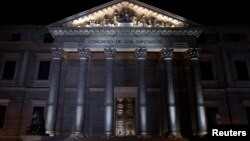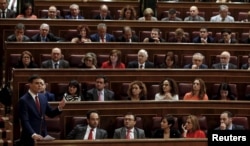Spain's King Felipe decided Monday not to open a new round of one-to-one talks with party leaders to give them more time to reach a coalition deal, although so far they are unwilling to bridge their divisions as a potential new election looms.
After Socialist leader Pedro Sanchez failed to win enough support Friday, parties have until May 2 to reach a parliamentary majority and form a government or the lower house will be dissolved and a new election will be called.
Sanchez won the support of only 131 members of the 350-strong parliament, with the opposition of acting Prime Minister Mariano Rajoy's conservative People's Party (PP), anti-austerity Podemos and five smaller parties scuppering his pact with newcomer Ciudadanos.
Although businesses and investors have so far remained calm about the deadlock, a new election would raise the risk that Spain's uneven economic recovery might be impaired by lost months of political leadership.
Talks postponed
The king's office said in a statement he would postpone formal talks with leaders, which he has held twice since a December election when Spaniards deserted the two traditional parties to vote for newcomers.
But with the clock ticking there are few signs that parties are willing to move from their entrenched positions in the negotiations that have often boiled over into vitriolic attacks.
Rajoy, in Brussels for EU talks on refugees, said a new election would be "ridiculous," and repeated that Sanchez should join the PP in a coalition of center left and center right, which the Socialist leader has rejected.
"I will call Mr. Sanchez and if, as has been the case so far, he does not want to see me, evidently I will not be able to do anything else," he told reporters on arriving.
Sanchez hopes to persuade Podemos to join his "government of change" and the upstart party's leader, Pablo Iglesias, who is holding out for an alliance solely between leftist parties, said Monday he would reopen talks between the two.
But Iglesias has said an agreement with Sanchez is only possible if he abandons business-friendly Ciudadanos, something strongly opposed by many Socialist politicians.
In a survey by pollster Metroscopia published Sunday in the newspaper El Pais, Ciudadanos' leader Albert Rivera and Sanchez were seen as the two leaders who had come out best from the investiture debate, with Iglesias as the worst.









